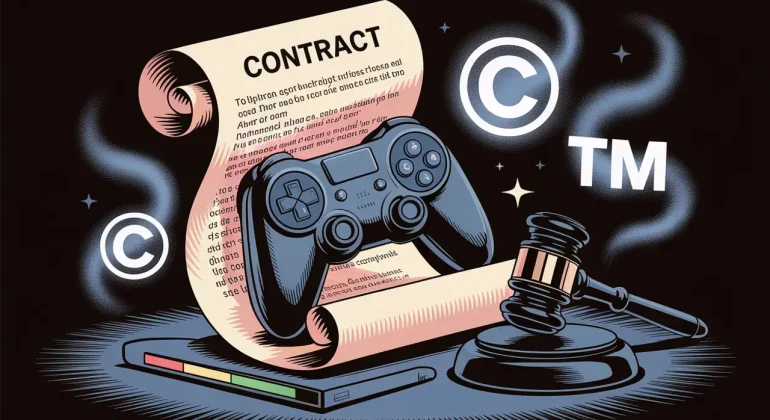The resale of digital video games raises significant legal issues, primarily related to licensing agreements and copyright. Unlike physical games, digital games are subject to strict rules prohibiting their resale, a practice consumers might naturally expect given the intangible nature of these products. This article analyses the legal reasons behind this prohibition and the consequences for consumers and market players.
Sommaire
Legal issues surrounding the resale of digital video games
The nature of digital video games
Digital video games are purchased and downloaded through online platforms. One of the main distinctions from physical games is that consumers do not actually purchase the game, but instead obtain a usage license that grants them the right to use the game for a set period, without becoming the owner of the game or its content.
These licenses are personal and non-transferable. The terms are specifically outlined in the agreements that users accept upon purchase. It is due to this lack of ownership that it is legally impossible to resell an online video game.
Licensing agreements and copyright protection
Video games are protected by copyright, which grants the publisher exclusive rights to distribution and use, as outlined in the Intellectual Property Code. This explains the strict restrictions associated with them.
Licensing agreements serve to protect these rights and limit the use of the games within the framework set by the publisher. For publishers, this is an effective means of controlling the distribution of their works and preserving their economic model.
The absence of a second-hand market for online video games: a consequence of copyright law
Exhaustion of rights and its limits in the digital video game sector
The exhaustion of rights principle is an important concept that allows a physical item to be resold freely after its first sale, provided that the sale occurred within the European Union. However, this principle does not apply to intangible goods, such as digital video games.
Indeed, according to Article 4 of Directive 2001/29/EC on copyright, the exhaustion of rights applies only to tangible items, not to services or digital products like video games. This rule is intended to protect the interests of publishers and prevent the uncontrolled circulation of digital products.

Jurisprudence and the absence of a resale right
The Court of Cassation recently clarified the issue of the exhaustion of the distribution right for an online video game in its judgment of October 23, 2024 (n° 23-13.738), rejecting the appeal by the UFC-Que Choisir association against Valve Corporation regarding the resale of digital video games on the Steam platform, where the general terms prohibited resale and the transfer of accounts or subscriptions purchased on the platform.
The court confirmed that video games are complex works that include graphic, sound, and narrative elements, protected by Directive 2001/29/EC on copyright, rather than Directive 2009/24/EC relating to computer programs. This distinction aligns with earlier CJEU rulings, which clarified that the exhaustion of rights applies only to tangible objects, not digital products.
Several decisions confirm this trend, notably including:
- Nintendo (January 23, 2014): in this case, Nintendo sued PC Box for selling downloadable video games online. Nintendo challenged the resale of copies of its digital video games without its authorization, after consumers had downloaded the games via a download code.
- Tom Kabinet (December 19, 2019): Tom Kabinet, a Dutch website, set up a marketplace for reselling digital copies of e-books. The case concerned the legality of reselling these copies after their initial purchase.
The future of video game resale online
Possible legislative changes
In the context of potential European legislative reforms, some argue for relaxing the rules regarding the resale of digital video games. In 2021, the European Commission launched a public consultation to explore legislative reform options for the digital market. However, the economic model of publishers and the protection of copyright remain key issues that delay in-depth reform.
Certain consumer-friendly initiatives, such as the creation of more flexible, potentially transferable licenses, could reconcile the interests of publishers and users, creating a controlled resale system on authorized platforms.
The role of distribution platforms
Online video game distribution platforms, such as Steam or PlayStation Store, play a central role in regulating the market for digital video games. While these platforms sometimes offer sharing or exchange systems, they still limit the free resale of games. Their policies are driven by the licensing agreements negotiated with publishers and developers.
Conclusion
The prohibition of the resale of online video games is mainly due to the structure of licensing agreements and copyright law. Video game publishers maintain strict control over the distribution of their digital products, preventing the creation of a second-hand market. While some legislative changes could relax these restrictions, the current framework continues to favor the economic interests of publishers over consumer rights.
Dreyfus Law firm assists its clients in managing complex intellectual property cases, offering personalised advice and comprehensive operational support for the full protection of intellectual property.
Dreyfus Law firm works in partnership with a worldwide network of lawyers specialising in Intellectual Property.
Join us on social media!
Nathalie Dreyfus with the assistance of the entire Dreyfus team.
FAQ
- Why can’t digital video games be resold?
Digital video games are governed by licensing agreements that prohibit their resale, due to their copyright protection. - What is a video game license?
A video game license is a contract between the consumer and the publisher, allowing the consumer to play the game under specific conditions, without owning it. - Are there any exceptions to the resale ban for digital video games?
In some cases, a perpetual license may allow for the transfer of usage rights, but these situations are rare, and permissions must be explicitly stated. - What are the legal risks of reselling digital video games online?
Unauthorized resale may lead to legal action for infringement of copyright and licensing agreements.

